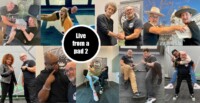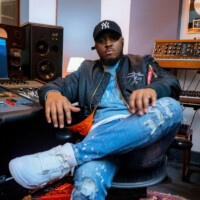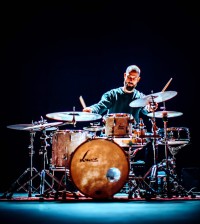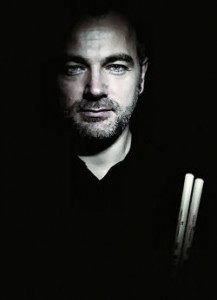 Mark Richardson is probably the hardest hitting drummer in the country.
Mark Richardson is probably the hardest hitting drummer in the country.
This, paired with his energy and presence behind the kit, make him one of the hottest rock drummers out there. But there are many more sides to the ferocious powerhouse behind Skunk Anansie. Mark’s journey as a drummer is in full flow and his recent dive into the session scene gave him even more motivation to push his drumming into a new direction.
Besides all that he is a very successful business man, contributing to the music business when he’s off the drum stool too.
Let’s first talk about your main gig Skunk Anansie. It’s been going quite a while since the reunion.
Yes, we got back together in 2009 after an eight year break. We always had a contractual obligation to do a ‘Greatest Hits’ album and we had a meeting to discuss how we were going to do that. We had the option to just let the label do it, but we always want to have control in what we release because it always ends up being a better package, so we decided to be involved. We had so much fun during that campaign that we decided to write another record, and that turned into another five years and we’re just starting on album number six now. That will come out at the end of the year and hopefully we’ll be around for a long time to come.
Has anything changed for you as a drummer?
Yeah, quite a lot actually. I think I have matured and developed a more subtle side to my playing – which was always there really, but I never let it out because I was always to insistent on being a ‘Power House’. But there were always mellow songs like Hedonism, Weak and Secretly. It’s hard to explain, but the band was a particular animal – we made our name being a great live, fierce Rock band with these smatterings of beauty and light in places – and I had always been that kind of player. 90% of what we do is heavy and ferocious so that’s what I do.
I kind of defined myself by the music I played instead of practising everything. I’ve never been a fully rounded player who’s got all of those different genres under his hat like all these kids now coming out of music schools now. They can play everything really well. They have all the rudiments and a practise ethic – none of the schools were around when I was a kid. John Bonham, Stewart Copeland and Brian Downey and those guys were my teachers and I just used to play along to their records. That’s all I knew.
So now, to answer your question, I’m coming into a phase where I want to learn more and I’m understanding what my weak spots are – independence, my left hand is atrocious, and knowing my rudiments. In one way it’s like standing at the foot of a huge mountain of practise and learning but on the other hand it’s actually really enjoyable. Now when I go in my studio I actually want to practise, I was never able to do that. Usually I’d see something shiny and just follow that instead… [laughs] … as a hedonist, there was much better things to do than practise, like going out on my bike.
I’ve been misunderstood in the past when I’ve done clinics as saying you don’t have to practise, which is absolute bullshit. I’ve never been one who slags off people that practise, all I’ve said is that it’s not something that I have done because I found it very difficult, and I still do. That’s just the person I am. But as I’m getting older I find it easier, so I’m doing more and I’m getting better but I could never spend eight hours a day practicing rudiments – I have a life!
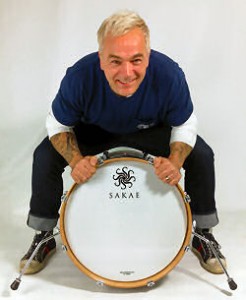 I know you took some drum lessons during that time as well. What made you dig deeper in the first place?
I know you took some drum lessons during that time as well. What made you dig deeper in the first place?
Yes, I went for some lessons with Mike (Dolbear) working on independence. I was doing some clinics a few years ago and in some sense it was either my biggest mistake to accept that first clinic or the best idea I’ve ever had, I’m not quite sure which [laughs]. As soon as you emerge yourself in that world – i.e. pit yourself against these guys who have spent eight hours a day for 15 years practising, then you realise what kind of dedication it takes to get that down. I’m not talking about guys who can just solo for an hour without stopping and play a million notes a minute, that just bores me, I’m talking about people like Neil Wilkinson and Ash Soan who have that beautiful mix: they have all the technique, they’ve done the practise and know the rudiments, but they understand groove and how the two come together.
For me it all has to be song related, otherwise there’s no point in it. If it’s not usable than there is absolutely no point in it for me. Music was always about escaping 9-5. I can’t even put it into words how terrified I was of leaving school and ending up in an office job. I decided on music when I was 14. It was when I played my first gig and felt the reaction from the crowd. I decided then that music is something that I wanna do way more than anything else. Nothing else interested me. It’s all about instant gratification, if there’s no joy in it, then what’s the point?!
So do you have a practise routine?
I don’t have a routine, I just go in when I really want to play and then it normally ends up being two or three hours. It seems to just fly past because I’m interested in it and want to be there. The older I get, the more I want to practise, but I still have a long way to go. I said to Mike, one of the reasons for me going for lessons is because one day it would be nice to get up on one of them stages at a clinic and have the confidence to just do a little five minute solo. So, you know, I’m working on it – and I think that’s all you can ever ask of yourself. If you’re always taking little steps forward, if you’re always making an effort to be a little bit better then you will get better. I’ll always be learning! [laughs]
You have recently done a tour with Amy Macdonald. How did that come about?
We (Skunk Anansie) did an acoustic tour and my mate and bass player Jimmy Sims (Mika, Amy Macdonald, Bryan Ferry) came to see the show with his wife and joked that he didn’t know I could play quietly! He sent me a text one day saying that Amy needed a drummer and we kept joking about me playing drums for her. In the end he was like ‘No really I’m serious, are you free next year?’ I went over, we had a bit of a play and that was that.
That gig was actually another factor that led me down the path of more practise because I realised I had been smashing away for years and years and all of a sudden I was doing a Skunk Anansie acoustic tour and that Amy’s folky pop tunes gig and needed to be a little bit tastier. I needed to play the drums instead of trying to break them [laughs]. I worked on pop/folk grooves, playing quieter whilst not losing the groove, not drowning everybody out, you know, just being subtle and tasteful, which is really difficult for me [laughs]. It was a big learning curve and I loved it! There are a few more Amy gigs this year and I’m looking forward to them.
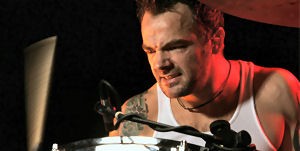 In that position you fulfil the role of a session drummer rather than a band member. How was that for you?
In that position you fulfil the role of a session drummer rather than a band member. How was that for you?
Weird. Really, really weird! I don’t know how they do it. I’m so fortunate to have been in bands for my whole career. It’s like you’re under a sort of protective umbrella within the music business, but as soon as you start doing the session stuff, it’s you on your own. You have to look after your own career, go out and network, find gigs, get to know people and keep in touch with them to form relationships. I mean, I’ve done that at a point in my career when I started with the Angels, which led to Skunk Anansie then Feeder, and back to Skunk Anansie. Session players have to network all the time until they get to such a level and build up such an amazing rep that people start calling them and they can stop having to chase it. The session world is a tough gig and I have nothing but admiration for all of them.
Was that a very different way of working for you?
Well, yes. Amy’s MD, Shannon Harris, said: “We know your reputation for being a heavy hitter but just make it relevant to what we’re doing here. Put your own stamp on it but keep it within the confines of the song.” Skunk Anansie velocities on an Amy Macdonald gig is just not going work obviously. It’s wonderful to play a different genre of music after playing one way for so long and it really has led me into a new era of my playing.
You’re one of the artists that went with the change from Yamaha to Sakae. How did you make that decision?
Yes. Let me first of all say I had a 20 year relationship with Yamaha and to leave them and not work with Gavin Thomas, Darren Power and Felicity Blakeman anymore was a hard decision. They always tried to do their best for me. I never wanted for anything in those 20 years and I was always looked after.
The simple truth is I wanted to continue playing hand-crafted Japanese drums made in Japan. When I toured in Japan with Feeder, Sakae Rhythm who were the company contracted to hand make all of Yamaha’s high end drums by hand, invited me to the factory make my own snare drum, so I’ve been around the factory, I know the process and have actually used it myself to make my own snare drum. I chose all the parts of the drum, the wood, all of the parameters and made the shell in the pressure moulding it was amazing and an experience I’ll never forget!
It was a difficult decision to leave Yamaha, but at the end of the day I wanted to remain with the manufacturer who has always made my drums – and that was Sakae.
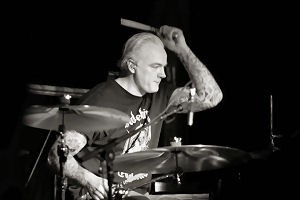 Has anything else changed for you equipment wise recently?
Has anything else changed for you equipment wise recently?
Well, not really. I mean, we’re using more sequencing and electronics now with Skunk Anansie, but in terms of drums I just got rid off a bass drum recently and decided to go back to a classic five piece: kick, snare, rack, 2 floors. Then two 20” A crashes, 23” Sweet Ride, 16” K Light Hats and a few electronics, the Nord Drum2, a Roland SPDS-SX and a SSD MacBook running Logic for sequencing.
With Skunk I’m using Sakae Celestial toms (13, 16, 18) and a 26” Almighty kick drum, which is awesome! All the 26’s I had so far were too deep so they were very difficult to manage. This one is pretty shallow, it’s 26×14, so it’s got the punch of a 22” but more low-end than a 24”. It’s a beautiful thing. With Amy I use the Trilogy series and Zildjian Keropes.
You’re also one of the founders of Tuner Fish Lug Locks? Great little tool. How did that come together?
I approached Mike Bigwood (who makes snare drums) in about 2002/3, just after I joined Feeder. My tuning rods were coming undone regularly and the little white plastic locks with the hole in it just weren’t cutting it. So I talked to Mike about it and said we should come up with something solid that actually stops the lugs moving all together. He had a think and made a little prototype. It looked a bit like a fish!
It was actually only ever meant for me, but people kept asking what they were and we started making more and more. So over the last 10 years it has sort of built up into its own cottage industry.
We got to a certain point though where we were about to call it a day when we met a guy with a marketing degree, Ian Aguado-Bush, who wanted to take it on and see what he could do. All the social networks had sprung up by then, he just got it on all of them rather than borrowing money for an ad campaign and we are now selling them all over the world.
We love the product and people want them, simple supply and demand.
 Are there possible ideas for more Tuner Fish products or are you focusing on the Lug Locks?
Are there possible ideas for more Tuner Fish products or are you focusing on the Lug Locks?
Yeah, definitely. There are a couple of ideas in the fire. A learning system for beginners that we’re developing in conjunction with the Clem Burke Drum Project and some other products to add to Tuner Fish.
You’re also involved in a video production company called BAM BAM Productions. How did you get into that side of the business?
Well I just started making some amateur videos for Skunk Anansie, but I did a bit of training and got better at it. I then ended up making the ‘Over the Love’ video with a production company in Holland while we were on tour and that turned out even better. I became quite competent at it and had the equipment to make good quality clips. A lot of people have that now, so there are a lot of production companies springing up, that’s the world we live in.
I was helping a mate out getting the online arm of DIME (Detroit Institute of Music Education) together of his new music school. It became so much work that I ended up joining forces with a couple of friends and we won the contract to film all the online content.
We are now also filming high quality music videos which cater to everyones budget. The only thing is I end up editing when I want to be practicing! A strange irony.
How has the Internet impacted your life as a musician over the years – especially from a band members point of view?
The internet changed everything over the last 15 years. The industry has really changed and the big royalty statement and advances are a thing of the past. That’s why I work hard building all the other businesses alongside Skunk Anansie; the session work, drum accessories company, production company, teaching, functions, workshops… they all add, in a small way to the overall income if you do it right. Especially with prices going up all the time and wages staying the same, its harder than ever out there.
We run our own label now to cut out the middleman and maximise our profit so we can keep doing what we do. We have to balance the books. No, its not very rock and roll but if we don’t do that there will be no Skunk. Major label subsidies are a thing of the past, as is band development. That’s why we’re seeing story’s like the one in Kerrang magazine a few weeks ago about signed bands who still work in Burger King.
The money just isn’t there, like it used to be, to support these artists full time and new artists have to build up a fan base to make people take notice. That’s the great side of the internet, a world wide audience at your fingertips, for free. You just have to make it work for you.
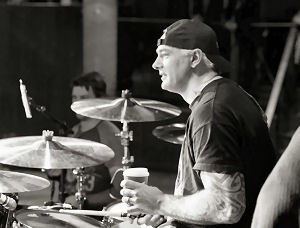 When do you think that flipped around?
When do you think that flipped around?
When Napster showed how music could be distributed digitally over the internet, the industry started to crumble and morph into something else which. As much as I don’t like it, Spotify is probably going to be the future; everybody will stream everything and nobody will want to own anything physical. It’s very sad in some respects but we have to look to the future and embrace it.
When I was a kid, I just went out and bought the whole record if I liked the single. I still do but generally that doesn’t happen much anymore. Unless you’re selling a lot of records or you can demand high fees, everyone needs alternative income streams. I’m 45 this year and I have build up contacts in all sorts of different areas over the years so I think, even if the industry hadn’t changed, I’d still be doing other things by now.
I like to keep busy! Anything to avoid practicing … [laughs]
April 2015

